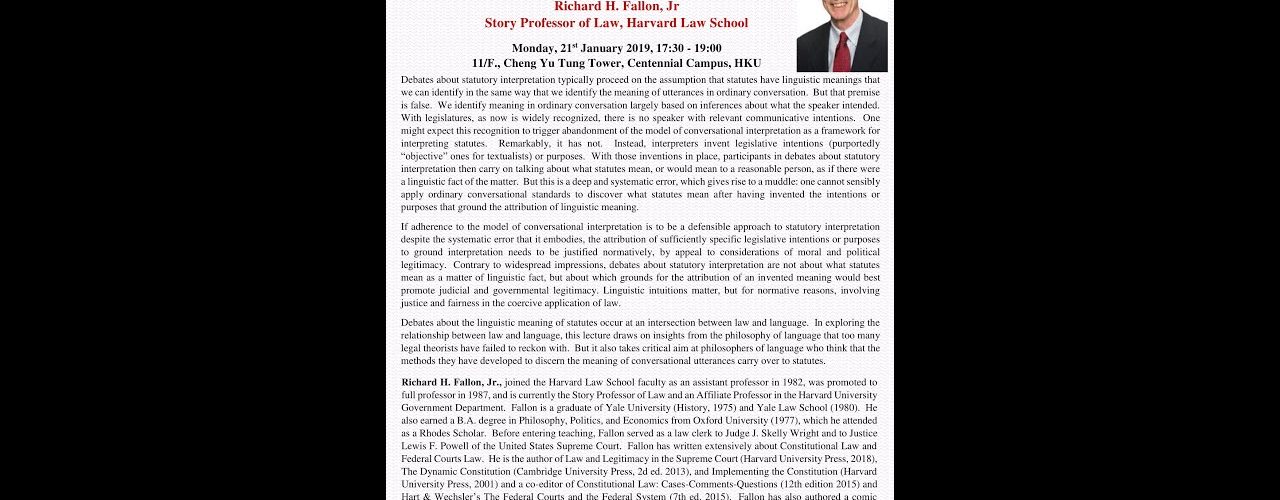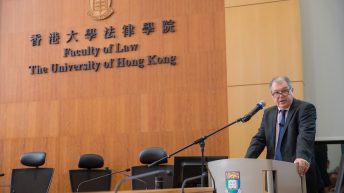Date: 21Jan 2019
Peter Allan Memorial Lecture in Public Law: The Statutory Interpretation Muddle by Richard H. Fallon, Jr (Story Professor of Law, Harvard Law School)
Debates about statutory interpretation typically proceed on the assumption that statutes have linguistic meanings that we can identify in the same way that we identify the meaning of utterances in ordinary conversation. But that premise is false. We identify meaning in ordinary conversation largely based on inferences about what the speaker intended. With legislatures, as now is widely recognized, there is no speaker with relevant communicative intentions. One might expect this recognition to trigger abandonment of the model of conversational interpretation as a framework for interpreting statutes. Remarkably, it has not. Instead, interpreters invent legislative intentions (purportedly “objective” ones for textualists) or purposes. With those inventions in place, participants in debates about statutory interpretation then carry on talking about what statutes mean, or would mean to a reasonable person, as if there were a linguistic fact of the matter. But this is a deep and systematic error, which gives rise to a muddle: one cannot sensibly apply ordinary conversational standards to discover what statutes mean after having invented the intentions or purposes that ground the attribution of linguistic meaning.
If adherence to the model of conversational interpretation is to be a defensible approach to statutory interpretation despite the systematic error that it embodies, the attribution of sufficiently specific legislative intentions or purposes to ground interpretation needs to be justified normatively, by appeal to considerations of moral and political legitimacy. Contrary to widespread impressions, debates about statutory interpretation are not about what statutes mean as a matter of linguistic fact, but about which grounds for the attribution of an invented meaning would best promote judicial and governmental legitimacy. Linguistic intuitions matter, but for normative reasons, involving justice and fairness in the coercive application of law.
Debates about the linguistic meaning of statutes occur at an intersection between law and language. In exploring the relationship between law and language, this lecture draws on insights from the philosophy of language that too many legal theorists have failed to reckon with. But it also takes critical aim at philosophers of language who think that the methods they have developed to discern the meaning of conversational utterances carry over to statutes.
Richard H. Fallon, Jr., joined the Harvard Law School faculty as an assistant professor in 1982, was promoted to full professor in 1987, and is currently the Story Professor of Law and an Affiliate Professor in the Harvard University Government Department. Fallon is a graduate of Yale University (History, 1975) and Yale Law School (1980). He also earned a B.A. degree in Philosophy, Politics, and Economics from Oxford University (1977), which he attended as a Rhodes Scholar. Before entering teaching, Fallon served as a law clerk to Judge J. Skelly Wright and to Justice Lewis F. Powell of the United States Supreme Court. Fallon has written extensively about Constitutional Law and Federal Courts Law. He is the author of Law and Legitimacy in the Supreme Court (Harvard University Press, 2018), The Dynamic Constitution (Cambridge University Press, 2d ed. 2013), and Implementing the Constitution (Harvard University Press, 2001) and a co-editor of Constitutional Law: Cases-Comments-Questions (12th edition 2015) and Hart & Wechsler’s The Federal Courts and the Federal System (7th ed. 2015). Fallon has also authored a comic novel, Stubborn as a Mule (Strategic Book Publishing, 2009). Fallon is a fellow of the American Academy of Arts and Sciences and a member of the American Law Institute. He is a two-time winner of Harvard Law School’s Sacks-Freund Award (2001 and 2006), which is voted annually by the School’s graduating class to honor excellence in teaching. Fallon’s 2018 book Law and Legitimacy in the Supreme Court was recently named as the recipient of the Thomas M. Cooley Book Prize by Georgetown Law’s Center for the Constitution.




